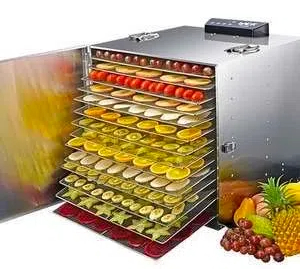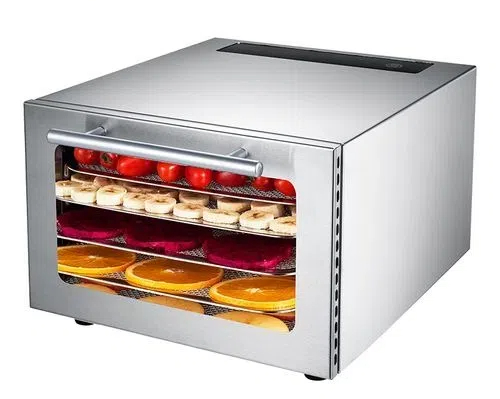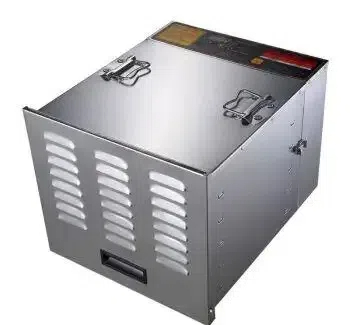
Content Menu
● Understanding Heat Pump Drying Technology
● Key Benefits of Using a Heat Pump Dryer for Food Processing
>> Energy Efficiency
>> Preservation of Nutritional Value
>> Improved Product Quality
>> Versatility in Drying Applications
>> Reduced Environmental Impact
>> Enhanced Control and Automation
>> Lower Operating Temperatures
>> Cost-Effectiveness
>> Space Efficiency
>> Support for Food Safety Standards
● Conclusion
● Frequently Asked Questions
>> 1. What types of food can be dried using a heat pump dryer?
>> 2. How does a heat pump dryer differ from traditional dryers?
>> 3. Are heat pump dryers suitable for small-scale food processing?
>> 4. What are the maintenance requirements for a heat pump dryer?
>> 5. Can heat pump dryers help reduce food waste?
In the world of food processing, drying is a crucial step that significantly impacts the quality, shelf life, and flavor of food products. As a leading manufacturer of food drying machines in China, we specialize in providing OEM services to international brands, wholesalers, and producers. While our focus is on food drying technology, we can draw parallels with the benefits of using advanced drying systems like the Candy heat pump dryer. This article will explore the key benefits of using a heat pump dryer, particularly in the context of food drying, and how these advantages can enhance food processing operations.

Understanding Heat Pump Drying Technology
Heat pump drying technology is an innovative method that utilizes a heat pump to transfer heat from the environment to the drying chamber. This process is energy-efficient and environmentally friendly, making it an ideal choice for food drying applications. Unlike traditional drying methods that rely on direct heat, heat pump dryers operate at lower temperatures, preserving the nutritional value and flavor of the food.
Key Benefits of Using a Heat Pump Dryer for Food Processing
Energy Efficiency
One of the most significant advantages of heat pump dryers is their energy efficiency. These machines can reduce energy consumption by up to 50% compared to conventional drying methods. This is particularly beneficial for food manufacturers looking to lower operational costs while maintaining high-quality products. The ability to recycle heat within the system means that less energy is wasted, making it a sustainable choice for food processing.
Preservation of Nutritional Value
Heat pump dryers operate at lower temperatures, which helps preserve the nutritional content of food. High temperatures can degrade vitamins and minerals, leading to a loss of quality. By using a heat pump dryer, food manufacturers can ensure that their products retain their essential nutrients, making them more appealing to health-conscious consumers. For instance, dried fruits processed with heat pump technology often retain more of their natural sweetness and vibrant colors compared to those dried with traditional methods.
Improved Product Quality
The gentle drying process of heat pump dryers results in better product quality. Foods dried using this method often have a more vibrant color, enhanced flavor, and improved texture. This is particularly important for fruits, vegetables, and herbs, where appearance and taste are critical factors in consumer acceptance. The controlled drying environment also minimizes the risk of over-drying or uneven drying, ensuring consistent results. For example, herbs dried with heat pump technology maintain their essential oils, providing a more potent flavor profile.
Versatility in Drying Applications
Heat pump dryers are versatile and can be used for a wide range of food products, including fruits, vegetables, meats, and herbs. This adaptability makes them an excellent investment for food manufacturers looking to diversify their product offerings. Whether you are drying apples, tomatoes, or fish, a heat pump dryer can accommodate various drying needs. This versatility allows manufacturers to experiment with different products and expand their market reach.
Reduced Environmental Impact
As sustainability becomes increasingly important in the food industry, heat pump dryers offer a more environmentally friendly option. Their energy-efficient operation reduces greenhouse gas emissions, and the ability to recycle heat minimizes waste. Additionally, heat pump dryers often use refrigerants with low global warming potential, further contributing to their eco-friendly profile. By choosing heat pump technology, food manufacturers can align their operations with global sustainability goals, appealing to environmentally conscious consumers.

Enhanced Control and Automation
Modern heat pump dryers come equipped with advanced control systems that allow for precise monitoring and adjustment of drying parameters. This level of control ensures that food is dried consistently and efficiently. Automation features can also streamline the drying process, reducing labor costs and minimizing human error. For instance, automated systems can adjust drying times and temperatures based on the specific moisture content of the food, optimizing the drying process for each batch.
Lower Operating Temperatures
The ability to operate at lower temperatures is particularly beneficial for sensitive food products. For example, herbs and spices can lose their essential oils and flavors when exposed to high heat. Heat pump dryers provide a controlled environment that allows for gentle drying, preserving the integrity of these delicate ingredients. This is crucial for maintaining the quality of high-value products, such as gourmet spices and specialty herbs.
Cost-Effectiveness
While the initial investment in a heat pump dryer may be higher than traditional dryers, the long-term savings in energy costs and improved product quality can make it a cost-effective choice. Additionally, the durability and reliability of heat pump dryers mean that they often require less maintenance and have a longer lifespan, further enhancing their value. Manufacturers can expect a return on investment through reduced energy bills and increased product sales due to higher quality.
Space Efficiency
Heat pump dryers are often designed to be compact and space-efficient, making them suitable for various production environments. This is particularly advantageous for smaller food processing facilities that may have limited space. The ability to stack or integrate these dryers into existing production lines can optimize workflow and increase productivity. Manufacturers can maximize their production capacity without the need for extensive facility modifications.
Support for Food Safety Standards
Food safety is a top priority in the food industry, and heat pump dryers can help manufacturers meet stringent safety standards. The controlled drying environment minimizes the risk of microbial growth and contamination, ensuring that dried products are safe for consumption. This is especially important for products that require long shelf lives, such as dried fruits and vegetables. By investing in heat pump technology, manufacturers can enhance their food safety protocols and build consumer trust.
Conclusion
In conclusion, the benefits of using a heat pump dryer in food processing are numerous and significant. From energy efficiency and improved product quality to versatility and environmental sustainability, these machines offer a modern solution for food manufacturers. As a Chinese food drying machine manufacturer, we are committed to providing high-quality OEM services to help our clients succeed in the competitive food market.

Frequently Asked Questions
1. What types of food can be dried using a heat pump dryer?
Heat pump dryers can be used for a variety of food products, including fruits, vegetables, meats, and herbs. Their versatility allows manufacturers to explore different drying applications.
2. How does a heat pump dryer differ from traditional dryers?
Heat pump dryers operate at lower temperatures and recycle heat, making them more energy-efficient and better at preserving food quality compared to traditional dryers, which often use direct heat.
3. Are heat pump dryers suitable for small-scale food processing?
Yes, heat pump dryers are compact and can be integrated into small-scale food processing operations, making them a versatile choice for various production environments.
4. What are the maintenance requirements for a heat pump dryer?
Heat pump dryers generally require less maintenance than traditional dryers, but regular cleaning and inspection of components are recommended to ensure optimal performance.
5. Can heat pump dryers help reduce food waste?
Yes, by providing a controlled drying environment, heat pump dryers minimize the risk of over-drying and spoilage, helping to reduce food waste and improve overall efficiency in food processing.












